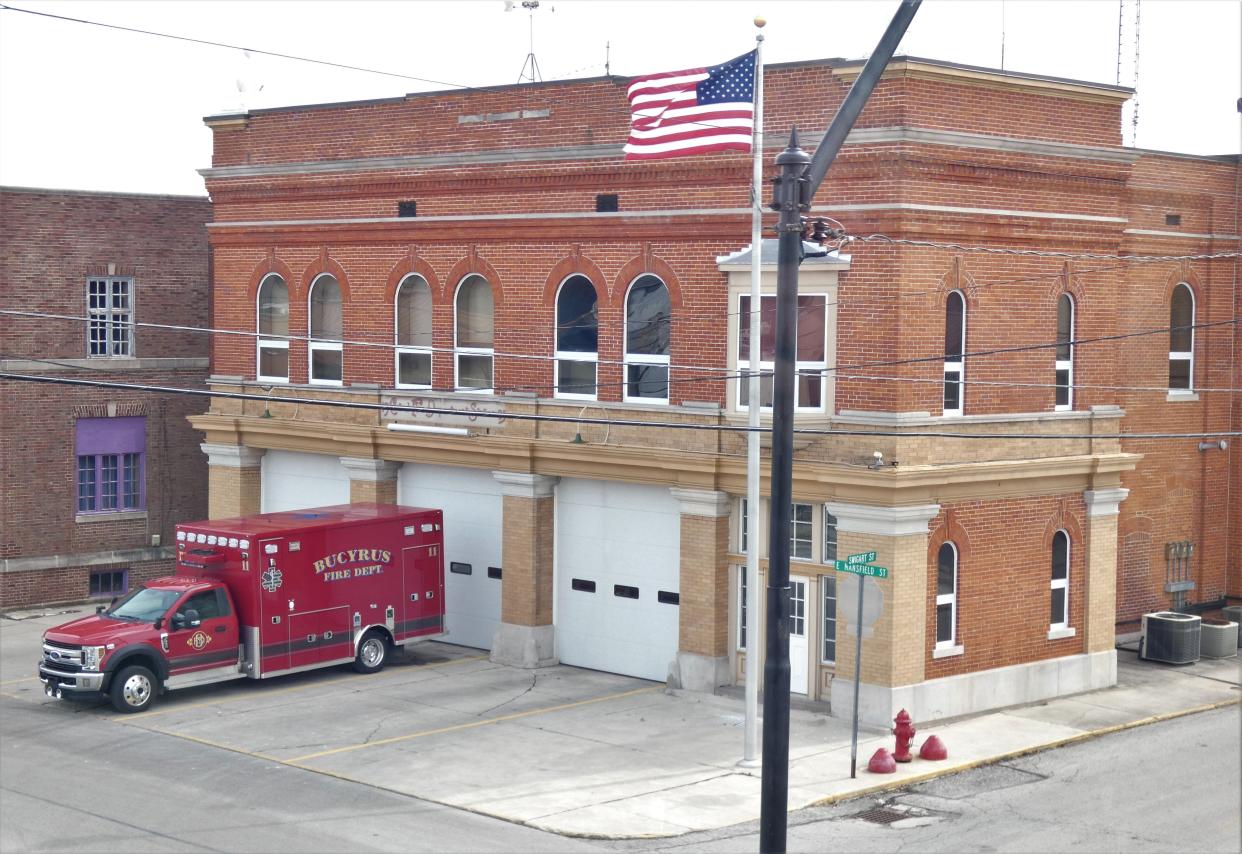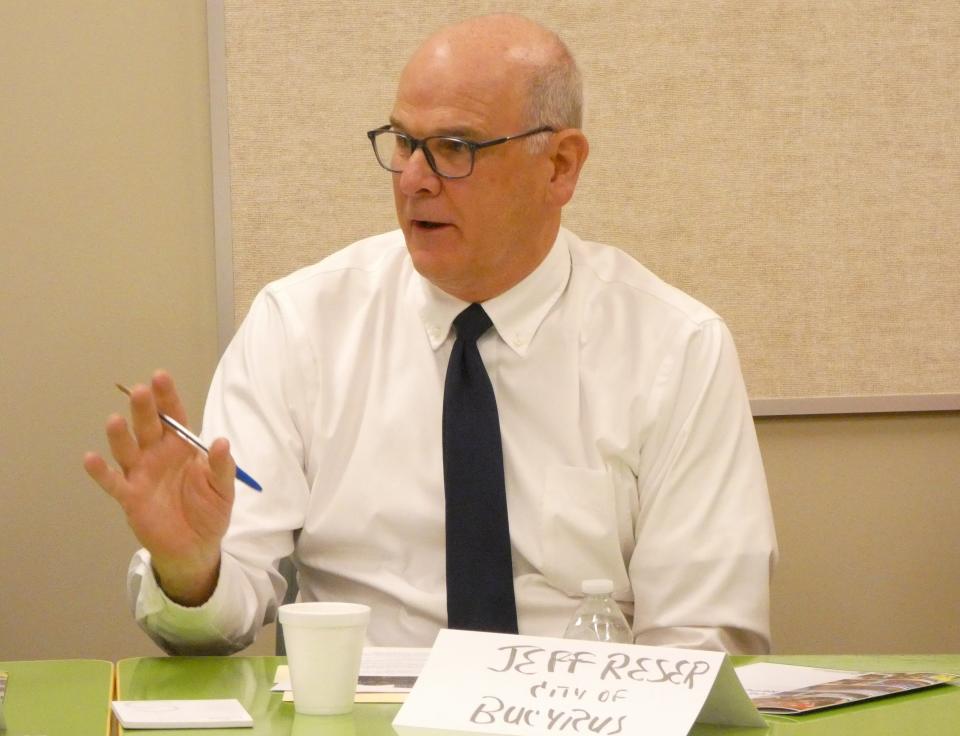Bucyrus asks voters to approve 0.25% income tax increase for safety forces

In Tuesday's primary election, Bucyrus voters will be asked to approve a 0.25% income tax that would provide money for general operations, maintenance, new equipment and capital improvements for the city's safety forces.
Based on 2022 income tax revenue, the measure is projected to bring in $852,980 a year, said Kali Lewis, the interim city auditor. Collection would begin July 1 and continue for five years.
Both Jeff Reser, the city's mayor, and Kevin Myers, a member of Bucyrus City Council, said the money is needed to help avoid a financial crisis looming on the horizon.
"We know that wages are going to continue to climb faster than the revenues are," said Myers, R-at large. "We know that to keep good employees on the job for our public safety, we're going to have to pay them what they're worth — which we saw with the fire department contract being a substantial increase, and we anticipate the police contract this year is going to be of a similar nature of an increase.
"We know you've got to pay for good things if you want to have good things. And so this is an attempt to take some of the stress off of the general fund and earmark some money just for our public safety, so that we know that money's always going to be there."
Reser, also a Republican, said he has repeatedly urged council members to first consider reducing or eliminating the 2% income tax credit the city gives residents who work in another municipality and pay income tax there.
"The money is needed. I'm not going to argue that the city won't need the money; it certainly does," Reser said. "We're going to have a shortfall this year, a substantial shortfall."

The city already has one safety forces levy, a permanent 0.5% income tax passed in November 2013.
"Times were different then," Myers said. "For one, we had more people working in Bucyrus. Since then, we've had a lot of industry close up. We've lost a lot of jobs, so the money that's coming in has declined. And we also have more services now than we did, with adding the emergency medical services to our department. That's three more vehicles that we have to own and maintain. That's more employees that we had to bring on to provide the services."
Council members decided to make the new levy renewable every five years, "so that we could earn the 'yes' vote each time," Myers said. "If people feel that we are not spending their money appropriately, then they've got every right to vote 'no' on it for renewal."
Reser: 'The triple witching hour that hit us'
Reser said it became clear the city was headed for budget problems a year ago, because of the rising costs of safety forces.
While the city was in negotiations with the police and firefighters unions, city leaders received word that GE Lighting, a Savant Company, planned to close its Bucyrus Lamp Plant, which would only make the problem worse, Reser said. After a contract with the Fraternal Order of Police had been settled, members of Bucyrus City Council went against the administration's recommendation and voted to accept a fact-finder's report granting firefighters a wage increase that was even larger than the union had requested.
"Knowing full well that we had financial problems," the mayor said. "Which made it worse."
"So we had the triple witching hour that hit us: We had higher wages that were on the horizon; we had General Electric closing, which cost us about $300,000 in revenue; and then City Council voted to accept a higher wage than what we could afford," Reser said.
Since the Bucyrus Fire Department took over EMS duties for the city and several nearby townships in October 2021, overtime costs have increased from $150,000 annually to roughly $600,000 last year, including benefits, he said.
"It turned out to be a lot more expensive than we thought, because we had to maintain six people," Reser said.
In an effort to reduce overtime, Reser and Service-Safety Director Jeff Wagner in February issued a directive reducing minimum staffing for the fire department from six people to four, seven days a week.
City Council members approved legislation returning the minimum to six. Reser vetoed that measure, but council overrode the veto. Minimum staffing is now back to six.
"So the issue is we're spending a lot of money," he said.
'Things cost more now'
Many other factors have contributed to the city's financial woes.
In 2011, former Gov. John Kasich substantially cut local governments' share of the state general revenue fund, Myers pointed out.
"You couple that with the economic downturn we've seen from the federal government here in the last several years with the recession that we're in, the cost of goods. COVID didn't do us any justice either. Things cost more now. Wages continue to climb at an exponential pace," Myers said. "And it all just kind of becomes the perfect storm where we aren't bringing in as much money as we used to, but we're spending more money than we ever have before."
The ever-increasing expenses are in danger of eating the amount the city will carry over into 2024, Reser said.
Having a healthy carryover balance is critical, Lewis explained.
"When we set up our budget, our budget is based on projections of what we are planning will come in for revenue," she said. "But we don't have that money currently. So what we're living on in the meantime, until those revenues start rolling in, is our carryover."
If the city doesn't carry over enough money into the new year, it may have to cut services or expenses, "because we don't have the money to pay for them," Lewis said.
The out-of-town workers' tax credit remains an issue
To Reser, the solution to the problem is clear: Eliminate the 2% tax credit for out-of-town workers.
Since neither retirees nor people who work outside the city pay city income taxes, the burden of supporting city services falls on a "relatively small" portion of city residents, he said. People who work in the city but live elsewhere also pay income taxes to Bucyrus.
"Fifty years ago, everybody who lived here, worked here. It's not that way anymore," he said. "A substantial amount of our citizens work out of town."
Most of the property taxes collected go to the county and school districts.
Despite Reser's recommendations, council members voted to seek an income tax levy instead of eliminating the tax credit.
Myers said he and his fellow council members believe the income tax is a more fair solution.
"We, as a council, made a commitment to our constituents that there's roughly 1,700 people that work out of town that file their city taxes to get that forgiveness," Myers said. "We made that promise to them that we would put this on the ballot to try to spread that out over the entire community of about 6,000 or 8,000 taxpayers, versus just those 1,700. We feel that it's more fair for all of us to share in a portion of the burden rather than to make just those 1,700 people have to foot the bill for this."
If the income tax isn't approved on Tuesday, council will have to reconsider that decision.
"We hope that those 1,700 people show up at the ballot and vote to spread that out over the entire community," Myers said.
There's one segment of the community that neither Reser nor Myers wants to see paying more taxes: retirees.
Taxing people on limited incomes would not be fair, Reser said.
"We also want to stress that it does not affect retirement income," Myers said. "So any person who's retired, we're asking for their 'yes' vote as well to try to make sure that we can continue to provide exemplary safety forces that the public deserves and expects."
Passage of income tax won't solve the whole problem
Reser, Lewis and Myers all said that even if the tax is approved, it will not generate enough money to eliminate Bucyrus' financial problems.
Given the firefighters' new pay rate, the amount generated by the proposed income tax would cover the overtime costs associated with keeping six firefighters on duty at all times, Lewis said. But the police union's contract is open for renegotiations this year.

"If the police are going for a similar raise, although there won't be the overtime, we're still going to eat into more of that money to be able to give them those raises," she said.
Myers said council members plan to pursue other options for bringing in more revenue, including annexation.
"We know that it's not even going to be enough to cover 100% of the expenses and we did that on purpose," Myers said. "We could have asked for an additional 1%, which would have covered all of our expenses, but we're in somewhat of a recession, and we know that people's dollars aren't going as far as it used to. So we really asked for the bare minimum to just get us by, knowing that we're going to have to do some of these other things coming down the road."
If council members want to "keep Bucyrus on a good, healthy path," they'll eventually need to reduce the tax credit, Reser argued.
Lewis said it's her role to make council members aware of the problem, and it's up to them to figure out how to solve it. There's definitely a problem.
"We have to figure out how to pay those first responders — if not that way, some other way. But we have to figure out," she said. "So this is what's currently on the ballot and I know this is what council is trying to pass before discussing any kind of reductions for the out-of-town workers' tax credits. I support what will keep the citizens the most happy and bring in the money required to retain those services."
Feedback has been positive, Myers said
Myers said he's been hearing positive feedback from voters ahead of Tuesday's vote.
"People understand that you have to spend money to have the things you need," he said. "It's kind of like taking care of your home. If you neglect certain things, they're going to become worse. If you neglect your public safety services, then bad things could potentially happen. So I think people understand that it's a necessary expense. It's not like asking for a levy for something frivolous that we could live without. These are services that are an absolute must for us to have a good, vibrant community, to attract new people to come to the community.
"When a new business wants to move to our town, they're going to look at what level of safety forces are we able to offer, amongst many other things. So we just feel that the reason we're asking for this is extremely important, and I think people have generally a good understanding of that."
There's a definite need, Reser said, but it remains to be seen what the taxpayers are willing to support.
"I understand there's pain to go around, but if we're going to maintain these services and be a viable community, there's some sacrifices that are going to have to be made," he said.
ggoble@gannett.com
419-559-7263
This article originally appeared on Bucyrus Telegraph-Forum: Bucyrus voters will decide on 0.25% income tax for safety forces

